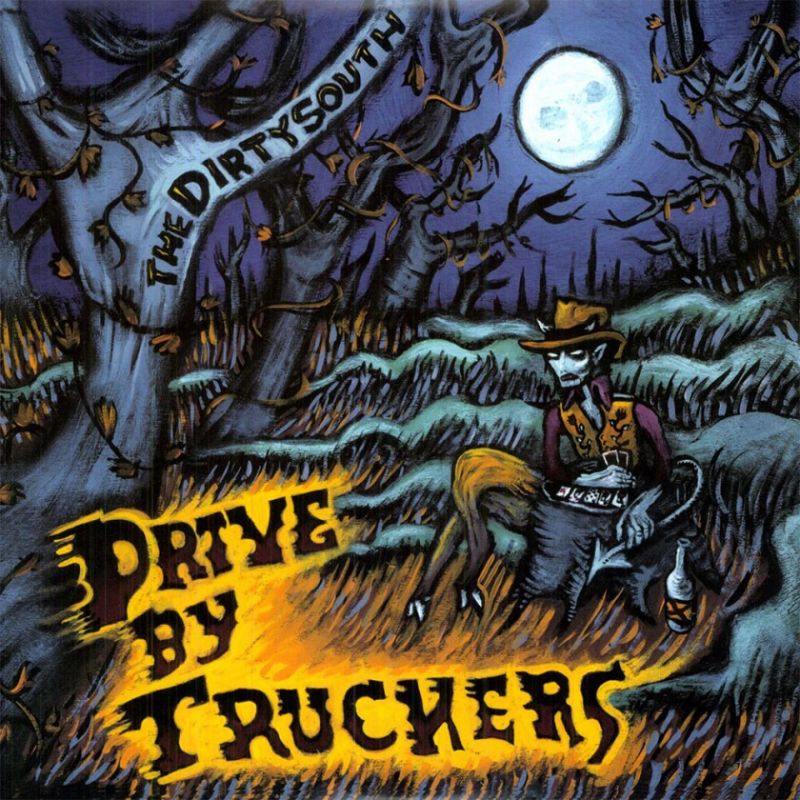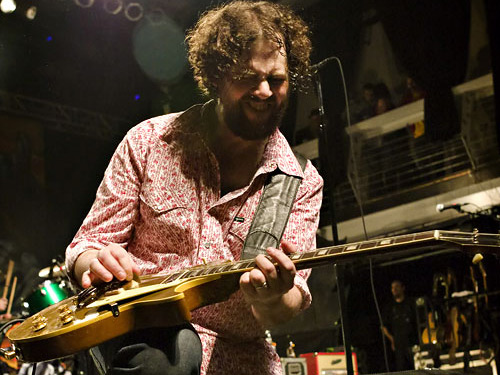
[vc_row][vc_column][vc_message message_box_color=”mulled_wine” icon_fontawesome=”fa fa-quote-left”]You can throw me in the Colbert County jailhouse.
You can throw me off the Wilson Dam
but there ain’t much difference in the man I wanna be and the man I really am.
We ain’t never gonna change.[/vc_message][/vc_column][/vc_row]
The Dirty South is the fifth album by Alabamian alternative country/Southern rock group Drive-By Truckers, released in 2004. The Dirty South is Drive-By Truckers’ third concept album. Like its two predecessors, the album examines the state of the South, and unveils the hypocrisy, irony, and tragedy that continues to exist.
Track list:
- “Where the Devil Don’t Stay” (Cooley)
- “Tornadoes” (Hood)
- “The Day John Henry Died” (Isbell)
- “Puttin’ People on the Moon” (Hood)
- “Carl Perkins’ Cadillac” (Cooley)
- “The Sands of Iwo Jima” (Hood)
- “Danko/Manuel” (Isbell)
- “The Boys from Alabama” (Hood)
- “Cottonseed” (Cooley)
- “The Buford Stick” (Hood)
- “Daddy’s Cup” (Cooley)
- “Never Gonna Change” (Isbell)
- “Lookout Mountain” (Hood)
- “Goddamn Lonely Love” (Isbell)
- “Where The Devil Don’t Stay” was inspired by a poem by Mike Cooley’s uncle Ed Cooley, and was recorded in one take.
- Patterson Hood’s “Tornadoes” was originally written in 1988 in reaction to the closing concert for the Adam’s House Cat Nightmare Tour. The Nightmare Tour set list was composed almost exclusively of songs containing metaphors or imagery of trains, but the lack of the tour’s success forced Hood and his band to abandon the concept and start afresh. Hood read an eyewitness account of the tornado in the local paper the next day and wrote “Tornadoes” after reading her statement that “it sounded like a train.”
- Isbell’s “The Day John Henry Died”, retells the story of John Henry.
- “Puttin’ People on the Moon”, written by Hood, tells the story of a town downriver of Huntsville and their “rocket envy” or economic depression due to the negative environmental and economic effects of NASA’s Marshall Space Flight Center.
- Mike Cooley’s “Carl Perkins’ Cadillac” recounts the celebrated Sun Records, Sam Phillips, and the music industry in general.
- “The Sands of Iwo Jima” recounts Hood’s experiences with his great uncle while growing up in North Alabama. Questioning the veracity of the movie, his uncle answers ironically that John Wayne was never there at the time.
- Isbell’s second track on the album, “Danko/Manuel”, is a departure from the usual southern gothic lyrical style written by Cooley and Hood. Originally Isbell tried to tell the story of Rick Danko, Richard Manuel, and The Band’s demise, but found the scope of the concept too difficult to actually do justice to their story, and instead shifted the concept to a telling of life of a musician through the eyes and actions of Danko and Manuel. Isbell stated that the horn parts for the song came to him in a dream.
- “The Boys From Alabama” was inspired by the misconceptions and “really bad movies” of the Redneck Mafia and recounts the movie Walking Tall from a “different point of view”. Hood felt that telling the story from “the bad guy’s” point of view would be more interesting.
- Cooley’s “Cottonseed” tells a story of corruption, crime, killing, greed, fixed elections, guns, drugs, prostitution and alcohol and uses subtle imagery to provide a very negative interpretation of Pusser.
- Hood’s “The Buford Stick” completes the suite by providing examples of the negative effects of Pusser’s actions while offering a less glorified view of the mythology surrounding Pusser.
- Cooley’s last song on the album is a story about a father who instills a love of racing in his son. Interestingly, “Daddy’s Cup” is the only song on The Dirty South that does not revolve around a negative experience, instead offering a lighter touch to the overall ‘dirty’ feel of the album.
- Isbell has explained that “Never Gonna Change” is simply about a stubborn North Alabama man who “refuses to live in fear,” which Isbell goes on to explain are rather rare.
- “Lookout Mountain” was written around 1990 by Hood, and can be heard in its original incarnation on Adam’s House Cat’s LP Town Burned Down. It was a last minute addition to the album, beating out another Hood song entitled “Goode’s Field Road.” …. The version as it appears on The Dirty South was recorded in one take.
- The Dirty South ends with Isbell’s “Goddamn Lonely Love.” Though described by Isbell as a love song, “Goddamn Lonely Love” heavily and painfully delves into the loneliness associated with love. Isbell wrote the song for Shonna Tucker.
As of February 2008, The Dirty South is Drive-By Truckers’ best-selling album.
The Dirty South was recorded at FAME Studios in Muscle Shoals, Alabama.
Personnel:
- Mike Cooley – guitar, vocals
- Patterson Hood – guitar, vocals
- Jason Isbell – guitar, vocals
- Brad Morgan – drums
- Shonna Tucker – bass




